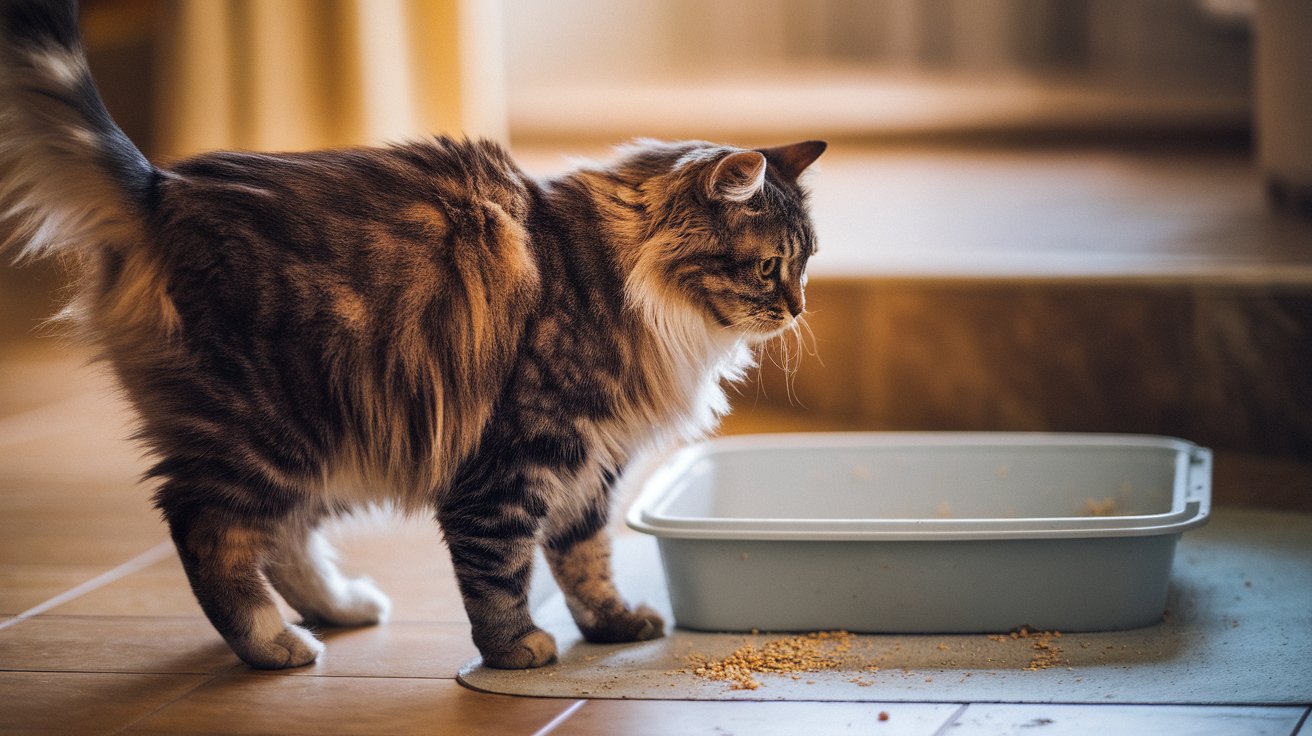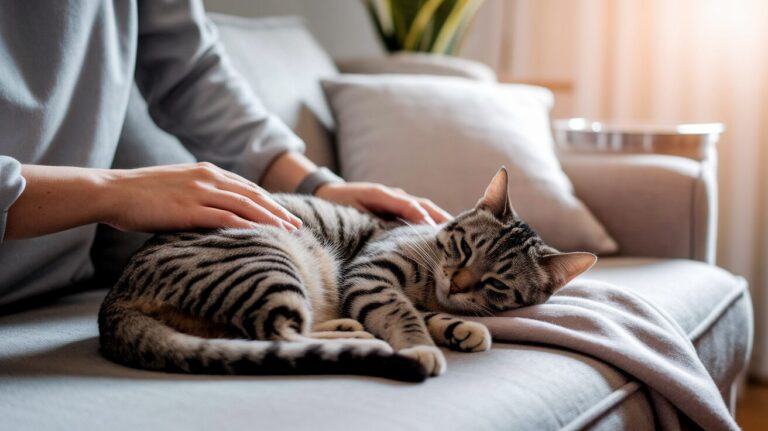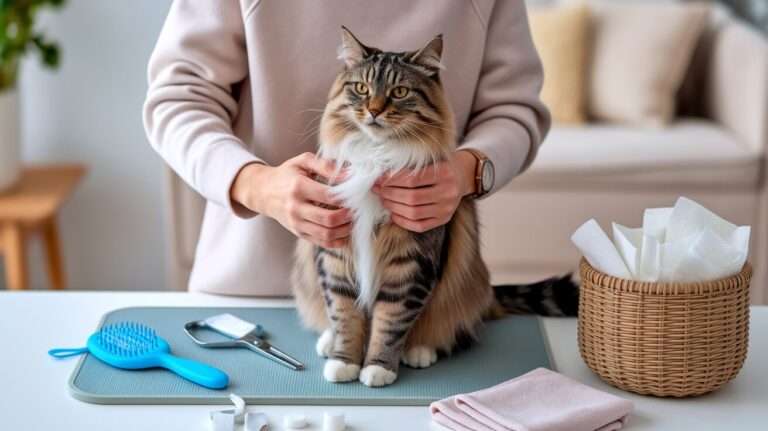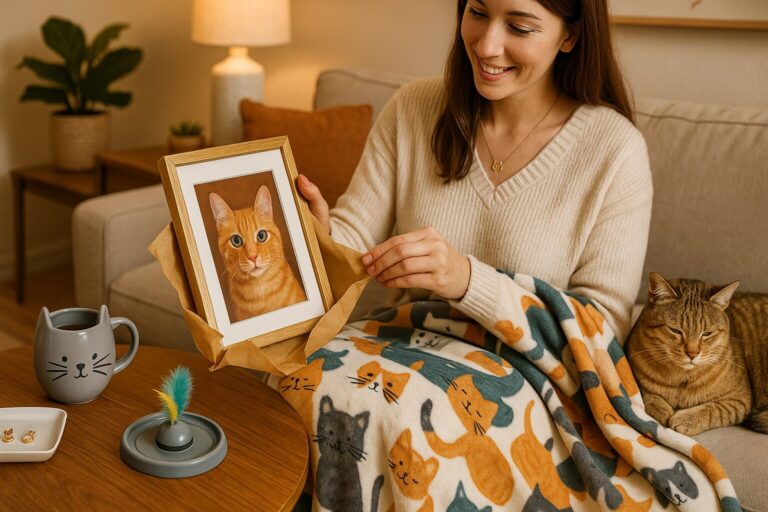Why Your Cat Won’t Use the Litter Box (& How to Fix It)
If your cat has suddenly stopped using the litter box, you’re not alone. Litter box avoidance is one of the most common problems cat owners face, and it can be incredibly frustrating. The smell, the cleanup, and the mystery of why it’s happening can leave you feeling overwhelmed.
The good news? There’s always a reason behind this behavior, and most of the time, you can fix it with a few simple changes. In this guide, we’ll cover the most common reasons cats avoid the litter box and practical solutions to get them back on track.
Common Reasons Cats Stop Using the Litter Box
1. Medical Issues (Always Rule These Out First)
Before assuming your cat is acting out, it’s essential to rule out health problems. Many medical conditions can make using the litter box painful or uncomfortable.
Signs Your Cat May Have a Medical Issue:
- Straining to urinate or defecate
- Frequent trips to the litter box
- Crying or meowing while eliminating
- Blood in urine or stool
- Avoiding the litter box entirely
Possible Medical Causes:
- Urinary Tract Infections (UTIs): A painful condition that makes urinating difficult and unpleasant.
- Feline Interstitial Cystitis: A bladder condition linked to stress and inflammation.
- Kidney Disease & Bladder Stones: These conditions can make urination painful or difficult.
- Constipation or Diarrhea: Stomach issues may cause your cat to avoid the box.
Solution: If you suspect any of these conditions, schedule a vet appointment immediately. Early diagnosis can prevent serious complications and help your cat feel better faster.
2. Litter Box Problems (Cleanliness & Setup Issues)
Cats are incredibly picky about their litter box environment. Even small issues with cleanliness, box size, or litter type can cause them to avoid it.
Common Litter Box Mistakes:
❌ Dirty Litter Box – Cats hate a filthy box. If it’s not cleaned daily, they may look for alternatives.
❌ Too Small or Enclosed – A cramped box or one with a cover may feel uncomfortable.
❌ Litter Type Issues – Some cats dislike scented or rough-textured litter.
❌ Not Enough Litter Boxes – If you have multiple cats, one box is NOT enough.
Solution:
- Scoop waste at least once a day and deep clean weekly.
- Try unscented, fine-grain litter for sensitive paws.
- Use one litter box per cat, plus one extra.
- Ensure the box is large enough for your cat to move around comfortably.
3. Poor Litter Box Placement
Where you put the litter box matters more than you think. If it’s in the wrong location, your cat may avoid it entirely.
Bad Litter Box Locations to Avoid:
❌ Next to a loud appliance (washing machine, dryer, etc.)
❌ Near food or water bowls (Cats instinctively avoid eliminating near their eating space.)
❌ In a hard-to-reach area (Older cats may struggle with stairs or enclosed spaces.)
Solution:
- Place the litter box in a quiet, low-traffic area.
- Keep it away from food and water bowls.
- If you have a large home, consider multiple litter boxes in different locations.
4. Negative Litter Box Associations
If your cat had a painful experience while using the litter box (e.g., UTI, constipation), they may associate it with discomfort or fear.
Signs of Litter Box Aversion:
- Avoiding the box but still eliminating nearby.
- Running away from the litter box after use.
- Hesitating before entering the box.
Solution:
- Try moving the litter box to a new location.
- Change the type of litter and box style to give them a fresh start.
- Use positive reinforcement (treats and praise) when they use the box.
5. Stress & Anxiety (Biggest Hidden Cause)
Cats are creatures of habit, and any change in their environment can trigger stress-related litter box avoidance.
Common Stress Triggers:
- New pets or family members
- Moving to a new home
- Changes in routine (travel, work schedule, etc.)
- Loud noises or household disruptions
Solution:
- Minimize stressors by keeping a consistent routine.
- Use pheromone diffusers (like Feliway) to create a calming environment.
- Provide hiding spots and safe spaces to help them feel secure.
6. Multi-Cat Household Issues
If you have multiple cats, litter box competition may be an issue. Some cats guard or block the box, making others reluctant to use it.
Solution:
- Follow the “1 box per cat + 1 extra” rule.
- Place boxes in different locations to reduce territorial behavior.
- Monitor interactions to prevent bullying around the litter box.
How to Get Your Cat Back to Using the Litter Box (Step-by-Step Fix)
- Rule Out Medical Issues – See a vet if you notice straining, blood in urine, or excessive licking.
- Keep the Box Clean – Scoop daily and wash the box weekly.
- Provide Enough Boxes – One per cat + one extra in multiple locations.
- Choose the Right Litter – Unscented, soft-textured litter is best for sensitive paws.
- Optimize Placement – Quiet, low-stress areas work best.
- Reduce Household Stress – Maintain routine & try pheromone diffusers.
- Use Positive Reinforcement – Reward proper litter box use with treats & praise.
FAQs About Litter Box Problems
Q: Why is my cat peeing outside the litter box all of a sudden?
A: Medical issues, stress, or a dirty litter box are the most common reasons.
Q: How do I stop my cat from pooping outside the litter box?
A: Ensure the box is clean, comfortable, and in the right location. If the issue persists, consult a vet.
Q: How do I clean up cat urine properly?
A: Use an enzyme cleaner to remove odors completely—cats may return to the same spot if they can still smell it.
Q: What’s the best litter for cats with sensitive paws?
A: Try unscented, fine-grain, soft-textured litter, like paper-based or wheat litter.
Creating a Stress-Free Litter Box Experience
Fixing litter box issues takes patience, consistency, and a bit of detective work. By keeping the litter box clean, addressing stressors, and making simple adjustments, you can help your cat feel comfortable again.
Has your cat ever had litter box problems? Share your experience in the comments below!








One Comment